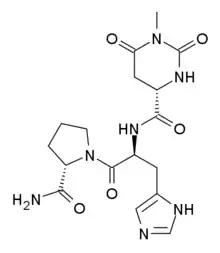Taltirelin
Taltirelin (marketed under the tradename Ceredist) is a thyrotropin-releasing hormone (TRH) analog, which mimics the physiological actions of TRH, but with a much longer half-life and duration of effects,[1] and little development of tolerance following prolonged dosing.[2] It has nootropic,[3] neuroprotective[4] and analgesic effects.[5]
 | |
| Clinical data | |
|---|---|
| Other names | (4S)-N-[(2S)-1-[(2S)-2-carbamoylpyrrolidin-1-yl]-3-(3H-imidazol-4-yl)-1-oxopropan-2-yl]-1-methyl-2,6-dioxo-1,3-diazinane-4-carboxamide |
| AHFS/Drugs.com | International Drug Names |
| Routes of administration | Oral |
| ATC code |
|
| Identifiers | |
| |
| CAS Number | |
| PubChem CID | |
| IUPHAR/BPS | |
| ChemSpider | |
| UNII | |
| ChEBI | |
| CompTox Dashboard (EPA) | |
| Chemical and physical data | |
| Formula | C17H31N7O9 |
| Molar mass | 477.475 g·mol−1 |
| 3D model (JSmol) | |
| |
| |
| | |
Taltirelin is primarily being researched for the treatment of spinocerebellar ataxia; limited research has also been carried out with regard to other neurodegenerative disorders, e.g., spinal muscular atrophy.[6][7][8]
References
- Fukuchi I, Asahi T, Kawashima K, Kawashima Y, Yamamura M, Matsuoka Y, Kinoshita K (April 1998). "Effects of taltirelin hydrate (TA-0910), a novel thyrotropin-releasing hormone analog, on in vivo dopamine release and turnover in rat brain". Arzneimittel-Forschung. 48 (4): 353–9. PMID 9608876.
- Asai H, Asahi T, Yamamura M, Yamauchi-Kohno R, Saito A (December 2005). "Lack of behavioral tolerance by repeated treatment with taltirelin hydrate, a thyrotropin-releasing hormone analog, in rats". Pharmacology, Biochemistry, and Behavior. 82 (4): 646–51. doi:10.1016/j.pbb.2005.11.004. PMID 16368129.
- Yamamura M, Suzuki M, Matsumoto K (October 1997). "[Synthesis and pharmacological action of TRH analog peptide (Taltirelin)]". Nihon Yakurigaku Zasshi. Folia Pharmacologica Japonica. 110 Suppl 1: 33P–38P. doi:10.1254/fpj.110.supplement_33. PMID 9503402.
- Urayama A, Yamada S, Kimura R, Zhang J, Watanabe Y (December 2002). "Neuroprotective effect and brain receptor binding of taltirelin, a novel thyrotropin-releasing hormone (TRH) analogue, in transient forebrain ischemia of C57BL/6J mice". Life Sciences. 72 (4–5): 601–7. doi:10.1016/S0024-3205(02)02268-3. PMID 12467901.
- Tanabe M, Tokuda Y, Takasu K, Ono K, Honda M, Ono H (February 2007). "The synthetic TRH analogue taltirelin exerts modality-specific antinociceptive effects via distinct descending monoaminergic systems". British Journal of Pharmacology. 150 (4): 403–14. doi:10.1038/sj.bjp.0707125. PMC 2189720. PMID 17220907.
- Takeuchi Y, Miyanomae Y, Komatsu H, Oomizono Y, Nishimura A, Okano S, et al. (July 1994). "Efficacy of thyrotropin-releasing hormone in the treatment of spinal muscular atrophy". Journal of Child Neurology. 9 (3): 287–9. doi:10.1177/088307389400900313. PMID 7930408.
- Tzeng AC, Cheng J, Fryczynski H, Niranjan V, Stitik T, Sial A, et al. (2000). "A study of thyrotropin-releasing hormone for the treatment of spinal muscular atrophy: a preliminary report". American Journal of Physical Medicine & Rehabilitation. 79 (5): 435–40. doi:10.1097/00002060-200009000-00005. PMID 10994885.
- Kato Z, Okuda M, Okumura Y, Arai T, Teramoto T, Nishimura M, et al. (August 2009). "Oral administration of the thyrotropin-releasing hormone (TRH) analogue, taltireline hydrate, in spinal muscular atrophy". Journal of Child Neurology. 24 (8): 1010–2. doi:10.1177/0883073809333535. PMID 19666885.
This article is issued from Wikipedia. The text is licensed under Creative Commons - Attribution - Sharealike. Additional terms may apply for the media files.